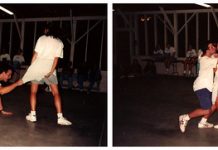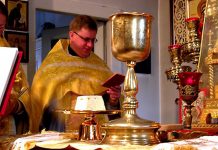The First Week
In a tradition dating back to biblical times, the celebratory joy of the wedding lasts for an entire week.1 The first week of marriage is celebrated by the newlywed couple in holiday fashion. Holiday finery is worn throughout, neither of them goes to work, and during this week the newlyweds are treated like a royal couple. This custom originates with the week of festivities which followed the marriage between Jacob and Leah.
This week is also called the “Sheva Brachot week.” During this week, a series of small festive get-togethers are held in honor of the couple, and they are called “Sheva Brachot” (“Seven Benedictions”), referring to the seven blessings recited following the Grace after Meals. These seven blessings – the same ones recited under the chupah – consist mainly of requests for G‑d’s blessing for the newlywed couple. The first Sheva Brachot follows the wedding meal.
Laws and Customs:
- The first week of marriage is celebrated by the newlywed couple in holiday fashionAs mentioned above, the bride and groom receive royal treatment the entire week. Accordingly, the newlywed couple, whether together or individually, doesn’t leave their home unaccompanied; they are accompanied by an “honor-guard” wherever they go.
- It is customary for the groom to be called up to the Torah for an aliyah on the Shabbat after the wedding.
- When the groom goes to the synagogue to pray, the entire congregation omits the Tachanun (confessional sections of the prayers which are omitted on festive days of the Jewish calendar) in honor of the festive atmosphere generated by the guest.
- Under some circumstances the bride and groom may be exempt from fasting on certain Jewish fast days if they occur during the first week of marriage. A rabbi should be consulted for an actual halachic ruling.
Sheva Brachot
The Sheva Brachot gatherings are not mandatory — and it certainly isn’t required to have one every day of the week. Nowadays, however, it has become relatively standard custom to have one every day. Traditionally, family and close friends divide the honors, often with several friends and/or family members collaborating on each of the Sheva Brachot.
The meal traditionally features singing and some words of Torah — delivered by the groom, bride, or another of the invited guests. When the meal is concluded, it is time for the highlight of the event — the Sheva Brachot blessings. After the grace is completed, six of the guests are invited to take a cup of wine and recite a blessing of the Sheva Brachot.
Laws and Customs:
- Before the Grace after Meals, two full cups of wine are prepared; one for the individual who leads the Grace, and the other for the Sheva Brachot blessings. The one who leads the Grace adds some words to the customary call to order: “Let us bless our G‑d in whose abode there is joy, of whose bounty we have eaten.” All those in attendance respond in kind.
- In some communities it is customary for the one leading the Grace to add the Devai Haser hymn into the Grace’s introduction. This hymn prays for the day when the Temple will be rebuilt, when we will all experience ultimate joy. Some omit this hymn during a Shabbat Sheva Brachot.
- “Let us bless our G‑d in whose abode there is joy, of whose bounty we have eaten.”After the grace is completed, six of the guests are invited to recite the first six blessings of the Sheva Brachot. The last blessing is considered the most prestigious one, and is normally reserved for a special guest. Each of the honorees recites the blessing while sitting and holding the Sheva Brachot cup.
- After the six blessings are recited, the person who led the Grace after Meals recites aloud the hagafen (wine) blessing and drinks from his cup. In many communities, the one who recited the last of six blessings also recites the hagafen and drinks from his cup. The wine in the two cups are then blended (a bit of wine from each cup is poured into the other), and the groom sips from one cup and the bride from the other.
- A minyan (quorum of ten adult Jewish men) must be present in order to recite the Sheva Brachot. This is an important detail to bear in mind when creating the guest list! If there is no minyan, only the last blessing of the Sheva Brachot, the Asher Barah blessing, is recited over a cup of wine — and this, too, only if there are three adult men (a “mezuman”) present.
- Another important consideration to take into account when creating a guest list is the need for the presence of a “new face,” i.e. someone who wasn’t present by the wedding or any of the previous Sheva Brachot. Click here for more on this topic.
Click here for a discussion regarding the mystical meaning of each of the Seven Benedictions.
The First Year
“When a man takes a new wife, he shall not go out in the army, nor shall it obligate him for any matter. He shall remain free for his home for one year and delight his wife whom he has taken” Deuteronomy 24:5.
An edifice is only as strong as the foundation which supports it. The first year of marriage serves as the foundation of the new home, and the couple’s time and energy should be devoted to nurturing their relationship. During this special year, both bride and groom are discouraged from engaging in any travel which involves an overnight stay away from each other.
www.chabad.org
HYDERABAD: Newly-weds across the world can now get blessings from
Lord Venkateshawara
just by sending a wedding card. The
Tirumala Tirupati Devasthanams
(TTD) has decided to launch a programme under which they will send ‘Akshintalu’ (Talambralu), `Kumkamam’, and `Kankanam’ with the blessings of Lord Venkateswara and Sri Padmavathi Ammavaru to couples who send their wedding invitation card, with complete address, to them.
They will also send a copy of
Kalyana Sanskriti
, a book written by TTD officer on special duty Dr
Samudrala Lakshmaiah
, along with Ashirvachanam of Lord Venkateswara signed by the TTD executive officer. The TTD’s dispatch section has been asked to send these to a mini mum of 10,000 newly-weds every year.
“The institution of marriage has a special place in the Hindu philosophy , which signifies the path for the young men and women to launch a new phase of life with confidence. The blessings of Lord Venkateswara is a unique and privileged bo on,” said an official statement of the TTD on Sunday .
Couples who wish to avail of the facility can send their wedding card to: The Executive Officer, TTD Administrative Buildings, KT Road, Tirupati 517501. They may also dial the TTD call centre: 0877 2233333 or 2277777 for more details.
timesofindia.indiatimes.com











